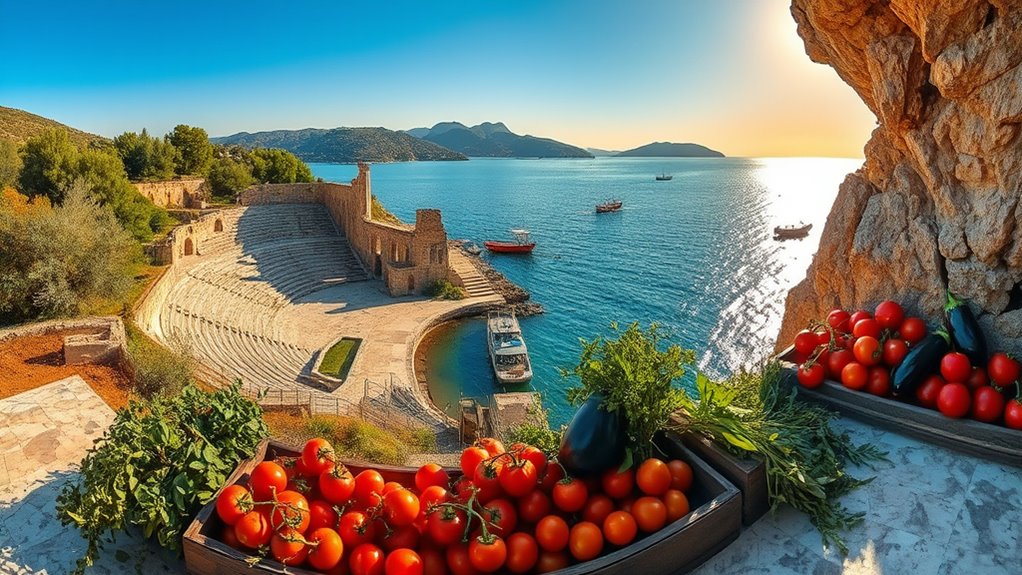In Greece’s Peloponnese, you’ll explore legendary ancient sites like Mycenae and Epidaurus, where history comes alive. Alongside, enjoy scenic coastlines with lively markets offering fresh produce, seafood, and local specialties. This region combines archaeological wonders with vibrant culinary stops, giving you a perfect balance of culture and flavor. As you progress, discover how the land’s rich history intertwines with its modern charm and delicious bounty—there’s always more to uncover.
Key Takeaways
- Explore iconic archaeological sites like Mycenae and Epidaurus to delve into Greece’s ancient history.
- Visit coastal towns with markets offering fresh local produce, seafood, and regional specialties.
- Discover the region’s rich culinary traditions through dishes made with olives, herbs, and seafood.
- Enjoy scenic drives along coastlines with stops at markets showcasing regional agricultural products.
- Experience the seamless blend of ancient sites, vibrant local culture, and modern innovations in Peloponnese.

Have you ever wondered what makes Greece’s Peloponnese so mesmerizing? It’s a region that seamlessly blends ancient history with stunning landscapes and vibrant local culture. As you explore, you’ll quickly realize that the Peloponnese is a treasure trove of archaeological wonders. From the legendary ruins of Mycenae to the ancient theater of Epidaurus, each site tells a story of a bygone era. Walking through these storied grounds, you can almost hear echoes of Greece’s rich past. These archaeological wonders aren’t just relics; they’re gateways into history that spark your imagination and deepen your appreciation for this land’s storied heritage.
Discover Greece’s Peloponnese: a land of ancient ruins, stunning landscapes, and vibrant culture that sparks your imagination.
Beyond the ancient sites, the Peloponnese offers a delightful culinary journey that’s just as captivating. The local cuisine here is a reflection of the region’s fertile lands and coastal bounty. As you visit small villages and bustling markets, you’ll find fresh olives, ripe tomatoes, and aromatic herbs that are key ingredients in traditional dishes. Sample some of the region’s famed olive oil or indulge in grilled seafood straight from the Aegean and Ionian Seas. Many coastal towns serve up local specialties that highlight seasonal flavors, giving you a taste of authentic Greek life. Whether it’s a hearty moussaka or a simple, fresh salad drizzled with local olive oil, every bite connects you to the land and sea.
Driving along the scenic coastlines, you’ll encounter charming stops at local produce markets where vendors proudly display their freshest catches and harvests. These stops are perfect for trying regional cheeses, honey, and fruit, offering a genuine taste of Peloponnese’s rich agricultural tradition. The combination of mouthwatering local cuisine and the proximity to fertile lands makes every meal an authentic experience that enriches your journey.
The region’s allure lies not only in its history and food but also in the way these elements intertwine. Ancient sites are often close to coastal towns where you can relax by the sea after a day of exploring. This synergy creates a balanced escape—where you can immerse yourself in Greece’s ancient past, then unwind with fresh, local flavors. Additionally, modern paint sprayer technology innovations have made it easier for travelers and locals alike to maintain and beautify these historic sites and coastal villages. The region’s allure lies not only in its history and food but also in the way these elements intertwine. Ancient sites are often close to coastal towns where you can relax by the sea after a day of exploring. This synergy creates a balanced escape—where you can immerse yourself in Greece’s ancient past, then unwind with fresh, local flavors. The Peloponnese invites you to discover its archaeological wonders and savor its coastal produce stops, making your trip a memorable blend of history, culture, and culinary delight. It’s a region that keeps you engaged, energized, and enthusiastic to uncover more at every turn.
Frequently Asked Questions
What Are the Best Months to Visit Greece’s Peloponnese?
You should visit Greece’s Peloponnese between late spring and early fall, from May to October, for the best weather. During these months, the seasonal weather is warm and pleasant, perfect for exploring ancient sites and enjoying the coast. Avoid peak summer months like July and August if you want to dodge tourist crowds. Early spring and late fall offer fewer visitors, but the weather may be cooler and less predictable.
How Accessible Are the Ancient Sites for Disabled Visitors?
You’ll find some ancient sites in the Peloponnese with accessible pathways, making exploration easier. However, others may have uneven terrain or steps that challenge mobility. If you need it, mobility assistance is often available, but it’s best to check in advance. Imagine strolling through historic ruins, feeling the history beneath your fingertips, with the right support. With planning, you can enjoy these timeless sites comfortably and fully.
Are There Guided Tours Available for Coastal Produce Stops?
Yes, guided food tours are available for coastal produce stops in the Peloponnese. You can join guided tasting experiences that take you through local markets, olive groves, and seaside tavernas. These tours often include expert guides who share insights about regional specialties like olive oil, honey, and fresh seafood. You’ll get an authentic taste of coastal life, making your visit both delicious and educational.
What Local Dishes Should Visitors Try in Peloponnese?
You’ll want to try local dishes like moussaka, a savory layered eggplant and meat casserole, or fresh seafood caught right off the coast. Don’t miss traditional recipes like pastitsio and souvlaki, which showcase authentic flavors. As you explore, you’ll notice how the rich local cuisine reflects the region’s history and produce. Savor every bite, knowing you’re tasting the true essence of Peloponnese’s culinary heritage.
How Safe Is Traveling Around the Region Independently?
Traveling independently around Peloponnese is generally safe if you stay cautious. Use reliable local transportation options like buses or rental cars, and avoid risky routes at night. Keep emergency services contacts handy, and don’t hesitate to reach out if needed. Be aware of your surroundings and plan your trips in advance. With common sense and preparation, you can enjoy exploring the region confidently and safely.
Conclusion
As you leave Greece’s Peloponnese, remember it’s more than just ancient ruins and coastal flavors. It’s a mirror reflecting your own journey—each stone and wave symbolizing memories carved into your story. Let the land’s timeless spirit inspire you to carry its warmth and wonder wherever you go. Just as the sea embraces the shore, carry the magic of the Peloponnese in your heart, forever tethered to your soul’s adventure.










